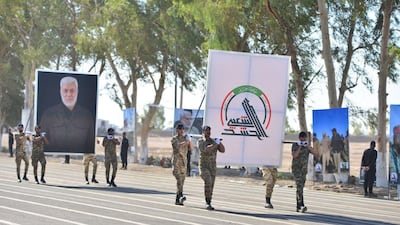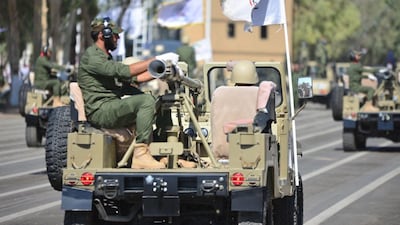Drones laden with explosives struck close to the capital of Iraq's Kurdish region, where a US consulate is under construction, Kurdish officials said.
The attack near Erbil occurred overnight on Friday, the Kurdistan Regional Government's counterterrorism unit said.
Three drones struck a house in Bragh village and another drone landing in an unpopulated area.
Only two of the three drones that struck Bragh exploded, causing damage but no casualties, the counterterrorism unit said.
Bragh is a few kilometres from where the new US consulate is under construction, according to the KRG-based news agency Rudaw.
The US consulate condemned the assault, saying, "This attack represents a clear violation of Iraqi sovereignty."
US interests in Iraq, including installations that house troops serving in an international coalition to fight ISIS, have come under repeated attack in recent months.
The use of drones is a relatively new tactic. In April, an explosives-laden drone hit the coalition’s Iraq headquarters in the military part of the airport at Erbil.
In May, an explosive drone hit the Ain Al Asad airbase housing US troops in western Iraq, and three more struck near Baghdad International Airport, where US soldiers are based, on June 9.
The US blames Iran-linked Iraqi armed groups for the attacks, including components of the state-backed Popular Mobilisation Forces paramilitary created to fight ISIS.
Later on Saturday, thousands of members of PMF staged a parade to mark the seventh anniversary its formation. Iraqi Prime Minister Mustafa Al Kadhimi, the country's commander-in-chief, presided over the parade.
“We affirm our work is being done under the flag of Iraq, and the protection of its land and its people is our duty,” he tweeted during the parade in the eastern province of Diyala.
It featured Russian-made tanks, boats and rocket launchers. Some vehicles were carrying what appeared to be drones.
Yazidi, Christian and Sunni militias in the PMF took part in the ceremony.
Since taking office in May last year, Mr Al Kadhimi has tried to rein in the influence of the Iran-backed Shiite militias that dominate the PMF.
His government was recently forced to back down in a stand-off following the arrest of PMF commander Qassem Musleh on terrorism charges.
He was arrested on May 26 by police intelligence on suspicion of ordering the killing of Ihab Al Wazni, a pro-democracy activist shot dead in the southern city of Karbala earlier that month.
Mr Musleh was released after two weeks, in a move that laid bare the limits of the government’s ability to bring militia leaders to account.




















